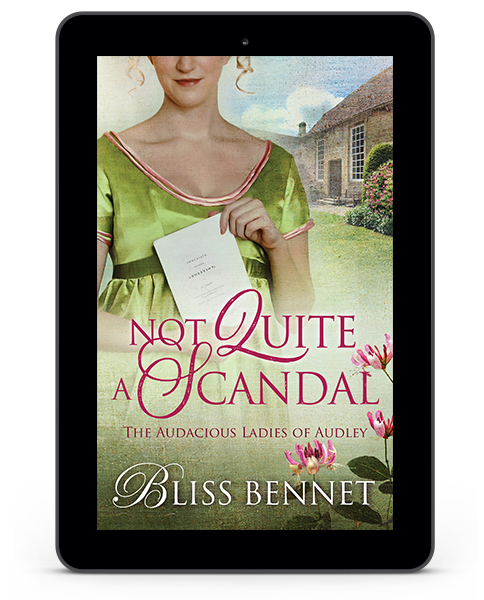Tuesday, February 27, 2024
RRR presents... The House Sitter by Elizabeth Drummond - REVIEW!
Silver Dagger Book Tours presents... NOT QUITE A SCANDAL by Bliss Bennet- COVER REVEAL + GIVEAWAY!
An inheritance lost. A betrothal threatened. A scandal brewing…
Are you ready for your next wish list addition? 😉 Well then, keep reading as we check out the gorgeous cover, a tempting synopsis, plus her you a chance to win in the Silver Dagger Book Tours tour wide giveaway!
Not Quite a Scandal
Audacious Ladies of Audley Book 2
by Bliss Bennet
Genre: Historical Regency Romance
An inheritance lost. A betrothal threatened. A scandal brewing…
Outspoken Quaker Bathsheba Honeychurch knows how difficult it is for an unmarried woman to successfully champion political change. Her solution? Wed best friend Ash Griffin as soon as he comes of age and begin remaking the world. But when Ash’s urbane, aloof cousin arrives with inconceivable news, Sheba’s future dreams are suddenly at risk…
The death of the Earl of Silliman reveals an appalling lie: it is not Noel Griffin, but his long-lost cousin Ash, who is the true heir to their grandfather’s title. Raised to place family above all, Noel accepts his grandmother’s bitter charge: find Ash, disentangle him from his religious community, and train him to take on the responsibilities and privileges of a title that Noel had been raised to believe was his. Noel certainly won’t allow a presumptuous, irritating Quakeress to thwart him in doing his duty—no matter how fascinating he finds her...
When scandal threatens both their reputations, can Sheba and Noel look beyond past dreams and imagine a new world—together?
Bliss Bennet writes smart, edgy novels for readers who love history as much as they love romance. Despite being born and bred in New England, Bliss has always been fascinated by the history of that country across the pond, particularly the politically-volatile period known as the English Regency. Though she's visited Britain several times, Bliss continues to make her home in the States, along with her spouse and an ever-multiplying collection of historical reference books.
Bliss's Regency-set historical romances have been praised as "savvy, sensual, and engrossing" by USA Today, "catnip for the Historical Romance reader" by Bookworlder, "romantic, funny, touching, and extremely well-researched" by All About Romance, and "everything you want in a great historical romance" by The Reading Wench. Bliss's latest book is Not Quite a Scandal, the second book in The Audacious Ladies of Audley series.
Website * Facebook * X * Instagram * Bookbub * Amazon * Goodreads
Follow the reveal HERE for special content and a giveaway!
$10 Amazon
Sunday, February 25, 2024
Storybook Sunday... THE STORYTELLER by Lindsay Bonilla, Illustrated by Noar Lee Naggan - REVIEW!

Friday, February 23, 2024
RRR presents... It's Complicated by Camilla Isley - REVIEW!
Wednesday, February 21, 2024
AWARENESS TOUR: Ode to a Pug by Jill Rosen, Illustrated by Stephanie Rohr - REVIEW + GIVEAWAY!
RRR presents... A Wartime Welcome from the Foyles Bookshop Girls by Elaine Roberts - REVIEW!
Tuesday, February 20, 2024
AWARENESS TOUR: Guess How Marion Feels by Miss Kaye, Illustrated by Miss Waitthk - GUEST POST + GIVEAWAY!
How to Teach Toddlers Emotional Intelligence
Our feelings, emotions, and affection are what make us feel connected to ourselves and our surroundings. It is the foundation of every relationship we form in our lives—the fundamental element in building stronger and lasting human connections.
Yet, it is the most tricky thing to teach. We are complex creatures with differences in culture, beliefs, parenting, gender identity, environment, neuro differences, personal biases, and many, many more. These could almost guarantee that each of us is one-of-a-kind on this planet.
Despite our uniqueness, we have common needs to meet. One of these needs is the sense of having healthy emotional connections. Brené Brown famously quoted Maya Angelou with these words, "You are only free when you realize you belong no place - you belong every place - no place at all. The price is high. The reward is great." Basically, the core of belonging is being yourself. It takes experience, challenges, achievement… even a lifetime to achieve this. In essence, the philosophy of knowing oneself is through self-awareness and consciousness.
In the realm of child development, one of the crucial aspects to consider is emotional self-regulation. This is the ability of the child to control their own emotions, handle frustrations, and resist impulsive behavior. As parents, caregivers, teachers, and concerned adults, it is our responsibility to guide little ones on this journey of self-regulation.
Understanding Self-Regulation
Self-regulation, in its essence, refers to a child's capacity to manage their emotions and behavior in accordance with the demands of the situation. It encompasses the ability to resist highly emotional reactions to upsetting stimuli, calm oneself down when upset, adjust to changes in expectations, and handle frustration without outbursts. These skills mature as children grow, allowing them to direct their behavior toward goals despite the unpredictability of the world and their own feelings.
Identifying Emotional Dysregulation
Emotional dysregulation can manifest differently in each child. Some may display instantaneous, intense reactions without warning, while others may have a slower build-up, leading to a behavioral outburst. The common thread is the struggle to manage strong emotions effectively. It's essential to recognize these signs and address them proactively.
Factors Contributing to Self-Regulation Challenges
Several factors can contribute to a child's difficulties with self-regulation. These include inherent temperament and personality traits, which may make self-soothing more challenging for some children.
Additionally, the environment plays a significant role; when parents consistently step in to soothe or solve problems, children may struggle to develop self-discipline. Conditions such as autism or anxiety can further compound these challenges, making it crucial to provide tailored support.
Teaching Self-Regulation Skills
Teaching self-regulation skills is not about avoiding difficult situations but rather coaching children through them and providing a supportive framework. This process, often referred to as "scaffolding," involves breaking challenging activities into manageable parts.
For instance, if a child struggles with a particular task, such as brushing their teeth, start with a simplified step, like applying toothpaste to the brush. Praise their efforts and gradually add more steps as they gain confidence.
The Power of Practice Runs
Another effective method to scaffold self-regulation is through practice runs. If a child tends to react impulsively or have tantrums in specific situations, create low-stakes scenarios for them to practice better responses. For instance, if shopping trips are a trigger, make short visits where they can practice walking calmly and keeping their hands to themselves. Reward their successes to reinforce positive behavior.
Encouraging Self-Reflection
To foster self-regulation, it's essential to encourage self-reflection in children. When they make mistakes or exhibit impulsive behavior, approach the situation calmly and provide non-judgmental feedback. Discuss what went wrong, why it happened, and how they can handle it differently next time. Creating an environment that promotes thoughtful, reflective, and self-aware behavior is key to long-term success.
Additional Tools for Self-Regulation
In addition to the techniques mentioned above, mindfulness and meditation can be beneficial for children, particularly those with self-regulation challenges. These practices help children focus on the present moment and develop greater emotional awareness. Parent training programs offer valuable resources for caregivers looking to enhance their coaching skills. For older children, dialectical behavior therapy (DBT) can provide essential tools for distress tolerance and emotion regulation.
The Family Environment's Role
Ultimately, the family environment plays a central role in fostering self-regulation. Consistency, patience, and ongoing support are fundamental. Remember that every child is unique, and progress may not always be linear. By modeling self-reflection and self-regulation, parents and caregivers create an environment where children can thrive and develop these crucial skills.
In conclusion, helping children improve their self-regulation skills is a vital aspect of their development. By understanding the nuances of self-regulation, identifying dysregulation, addressing contributing factors, and employing effective teaching methods, we can guide our children toward emotional maturity and self-control.
Remember, the journey may be challenging, but the rewards of seeing a child grow into a self-regulated individual are immeasurable.
Notes:
This article is intended as a comprehensive guide to fostering emotional self-regulation in children and should not replace professional advice or intervention when necessary.
References used are resources from the National Library of Medicine on the topic of Parenting in the Context of the Child: Genetic and Social Processes, Colombia University Irving Medical Centre, Medication from materials of Deepak Chopra, and other psychology books.
Powered by Blogger
Content by the Insatiable Reader
























.jpg)





%20-%20Karen%20Tolentino.jpeg)
